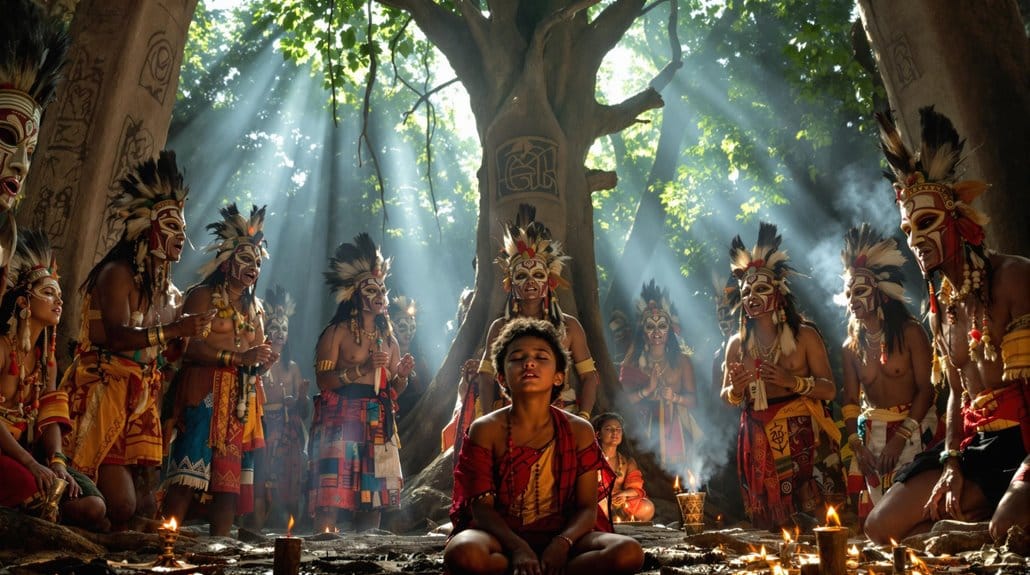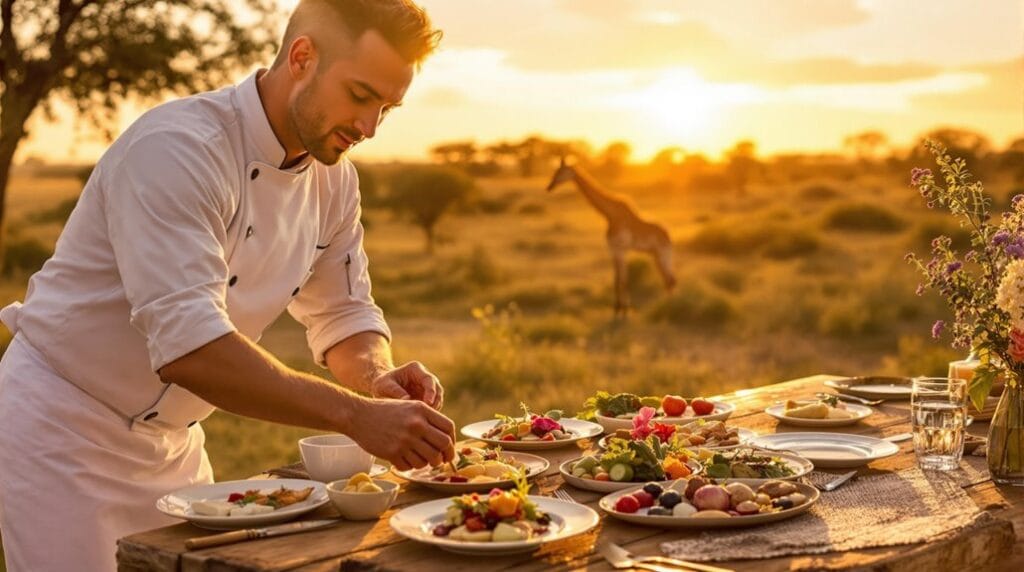When you explore the spiritual roots of African tribes, you uncover a complex web of beliefs that shape identities and foster community ties. Each tribe, with its unique rituals and reverence for ancestors, offers insights into how spirituality intertwines with the natural world. As you consider the influence of these traditions in contemporary society, you might wonder how the convergence of ancient practices and modern beliefs is reshaping these communities. What might this mean for future generations and their understanding of spirituality?
Key Takeaways
- African spirituality is diverse, reflecting the unique cultural identities and practices of various tribes like Yoruba, Zulu, and Igbo.
- Ancestor veneration is central to African spiritual beliefs, providing guidance and protection through rituals and offerings.
- Indigenous religions, rooted in pre-colonial traditions, continue to influence contemporary spiritual practices and cultural identity.
- Community engagement in rituals fosters unity and cultural continuity, strengthening social bonds among members.
- The connection to nature is emphasized in indigenous religions, highlighting ecological harmony and the interdependence of life.
Overview of African Spirituality
African spirituality is a rich tapestry woven from diverse practices and beliefs that reflect the unique cultural identities of the continent's numerous ethnic groups. At its core, you'll find a deep reverence for ancestors, who serve as protectors and guides. This connection is nurtured through rituals, offerings, and the establishment of ancestral shrines, reinforcing an enduring bond between the living and the departed.
In this spiritual landscape, many recognize a Supreme Being, yet your communication with this deity often flows through ancestors and spirit beings. This intricate cosmology defies simple labels of polytheism or monotheism, showcasing a more nuanced understanding of the divine.
Rituals play a crucial role, fostering community ties and cultural identity through practices like libations, sacrifices, and festive celebrations that honor both ancestors and deities.
Moreover, the adaptability of African spirituality shines through its ability to absorb elements from other religions while still holding onto core beliefs. This dynamic coexistence creates hybrid identities that enrich the spiritual landscape, allowing you to feel a sense of belonging in a world shaped by both tradition and change.
Embracing African spirituality invites you into a profound journey of connection and understanding.
Historical Context of Indigenous Religions
Indigenous religions in Africa emerged long before the arrival of Christianity and Islam, rooted deeply in pre-colonial spiritual practices that shaped cultural identities.
You'll find that these belief systems often center around the veneration of ancestors, who serve as crucial links between the living and the spiritual domain.
This rich historical context highlights how these traditions continue to inform and influence contemporary spiritual expressions across the continent.
Pre-colonial Spiritual Practices
How did the spiritual practices of various tribes evolve over time? In pre-colonial Africa, traditional African religious practices flourished, deeply woven into the fabric of daily life.
You'd find that tribes like the Yoruba, Zulu, and Igbo developed rich belief systems long before the arrival of Christianity and Islam. Venerating ancestors was a cornerstone of these practices, with families maintaining shrines where they sought guidance and blessings from their forebears.
Each ethnic group recognized a Supreme Being, but communication often flowed through deities and ancestral spirits, reflecting the continent's diverse cosmologies. Rituals and sacrifices weren't just acts of devotion; they were communal gatherings that reinforced social bonds, fostering a sense of belonging within tribes.
However, as global religions spread, these indigenous practices began to decline, now embraced by only about 10% of the African population.
Yet, many still integrate traditional rituals into their spiritual journeys, revealing a resilience and desire to connect with their roots. Your exploration of pre-colonial spiritual practices uncovers an essential part of African heritage, celebrating the enduring legacy of these traditions in shaping cultural identity.
Cultural Identity and Beliefs
The spiritual landscape of various tribes has been intricately tied to their cultural identities, with beliefs and practices reflecting their unique histories and values. Indigenous African religions, which predate Christianity and Islam, form an essential part of the cultural fabric that binds communities together.
| Tribe | Key Beliefs | Ritual Practices |
|---|---|---|
| Yoruba | Supreme Being, Ancestor veneration | Offerings, Festivals |
| Zulu | Connection to the land | Ceremonial dances, Healing |
| Igbo | Spirits in nature | New Moon celebrations |
Approximately 10% of Africans uphold these traditional beliefs, showcasing rich diversity in spirituality. Within this context, ancestors serve as protectors and guides, with rituals designed to honor them. This relational nature of spirituality emphasizes the importance of community and connection.
Moreover, the adaptability of African spirituality is evident in the blending of indigenous practices with global religions. This resilience not only strengthens cultural identity but also enriches the overall tapestry of beliefs, allowing everyone to find a sense of belonging within their unique spiritual journey. By embracing these traditions, you can connect deeply with your roots and understand the profound significance they hold in contemporary life.
Influence of Ancestors
Ancestors play an essential role in shaping the spiritual landscape of African tribes, acting as active participants in the lives of their descendants. Through ancestral veneration, you honor those who've come before you, recognizing their guidance, blessings, and protection.
In many cultures, maintaining ancestral shrines becomes vital; neglecting these sacred spaces can lead to misfortune and disrupt your spiritual connection.
In communities like the Igbo, you celebrate ancestors through vibrant festivals and masquerades, where cultural identity and social cohesion thrive. These events aren't just rituals; they reinforce your sense of belonging and continuity with the past.
Offering kola nuts, livestock blood, and other items serves to appease your ancestors, reminding you of the bond that ties the living to the spiritual domain.
The belief in ancestral spirits as intermediaries between humans and a Supreme Being enriches your understanding of African cosmology. It highlights a profound relationship with both the divine and your lineage, facilitating communication that honors the past while guiding your present.
Embracing this influence empowers you to navigate life's challenges, ensuring that the wisdom of your ancestors remains a guiding light in your journey.
Role of Ancestors in Spiritual Practices
In many African cultures, you'll find that ancestors play an essential role, actively guiding and protecting their descendants.
Rituals and offerings, like libations and sacrifices, create a bridge between the living and the spiritual domain, ensuring these revered figures remain engaged in daily life.
As intermediaries, ancestors facilitate communication with a supreme being, making their veneration a crucial practice in maintaining spiritual harmony.
Ancestral Guidance and Protection
Guided by the wisdom of their forebears, many African cultures view ancestors as crucial forces in their daily lives, offering insights and blessings during both mundane and momentous occasions.
You'll find that ancestral spirits are regarded not just as memories of the past, but as active participants in your present and future. They guide you through life's challenges, providing wisdom that shapes your decisions.
Maintaining ancestral shrines is essential; neglecting these sacred spaces can lead to misfortune, emphasizing the importance of honoring and communicating with your ancestors.
In various indigenous traditions, like those of the Bambara and Akan, offerings such as kola nuts and libations are made to seek their favor and protection. These acts foster a strong sense of community and reinforce cultural identity, particularly evident among the Igbo during festivals where ancestral spirits manifest.
Ultimately, the belief in ancestors as protectors and guides creates a rich spiritual cosmology.
You engage in this relationship, ensuring the continuity of cultural values and practices, which deepens your sense of belonging in a world that often feels disconnected. Through these connections, you find strength, support, and a profound sense of purpose.
Rituals and Offerings
Rituals and offerings serve as crucial expressions of the reverence held for ancestral spirits in various African cultures. In these communities, ancestor worship isn't merely a tradition; it's a vital lifeline connecting the living to those who've passed.
You'll find that these ceremonies often involve offerings of food, kola nuts, and even livestock blood at ancestral shrines. These acts symbolize a deep commitment to maintain these sacred ties, seeking blessings while warding off misfortune.
The collective participation in these rituals reinforces social bonds and cultural identity, making you feel a part of something greater. For instance, in the Bambara religion, offerings must be made to ancestors from at least one preceding generation, highlighting a structured approach to honoring the past.
Such practices remind you that ancestors are active participants in your life, providing guidance and protection. Sacrifices, like white sacrificial animals, serve not only for atonement and thanksgiving but also to fortify the connection between the living and the spirit world.
This intricate belief system surrounding ancestor worship emphasizes the significance of these rituals, enriching the communal experience and fostering a profound sense of belonging.
Intermediaries in Spirituality
While many cultures view spirituality as a direct connection to the divine, African traditions often place ancestors at the forefront as significant intermediaries. These revered figures actively guide and bless their living descendants, creating a profound connection that shapes daily life. By honoring ancestors, you maintain an essential link to your heritage and community.
Here are four key roles ancestors play in African spirituality:
- Guidance: Ancestors provide wisdom and direction, helping you navigate life's challenges.
- Protection: Through rituals, you seek their blessings to shield you from misfortune and adversity.
- Cultural Identity: Ancestor worship fosters a sense of belonging, reinforcing your ties to family and community.
- Communal Bonding: Shared rituals and offerings create a strong social fabric, connecting individuals toward a common spiritual goal.
Incorporating practices such as maintaining ancestral shrines and performing libations enables you to honor these significant intermediaries.
Key Beliefs Across African Cultures
Across diverse African cultures, you'll find a rich tapestry of beliefs that reveal deep spiritual connections and communal values. African traditional religions often emphasize the interconnectedness of the spiritual and physical domains, where ancestors aren't merely remembered but actively guide and protect the living. This reverence for ancestors fosters a sense of belonging, as you participate in rituals and offerings that honor those who came before you.
Many African belief systems recognize a Supreme Being, like the Yoruba's Olorun or the Akan's Nyame, while also engaging with various deities that embody nature and cultural values. These spiritual entities influence your personal destiny, as seen in the Igbo's concept of Chi, shaping your life journey in profound ways.
Communal participation is central to spiritual practices, reinforcing social cohesion and cultural identity. By maintaining ancestral shrines and engaging in community rituals, you strengthen connections with your tribe, creating a supportive network.
Fundamentally, these key beliefs across African cultures emphasize the importance of community, the strength of ancestral ties, and the guidance of spiritual forces that shape your existence.
Influence of Global Religions
The intertwining of global religions with indigenous practices has reshaped the spiritual landscape of Africa, presenting a complex tapestry of belief systems. With approximately 40% of the population identifying as Christian and another 40% practicing Islam, the influence on indigenous religions is profound. This evolution isn't merely a replacement; it's a blending of traditions that speaks to resilience and adaptation.
Consider the following:
- Hybrid Faiths: Unique religions like Candomblé emerge, illustrating how indigenous beliefs integrate with global religions.
- Ritual Adaptation: Many Christians and Muslims incorporate indigenous rituals, showing respect for ancestral traditions.
- Cultural Erosion: The decline of indigenous practices, now at about 10%, signals a potential loss of cultural identity.
- Community Ties: The communal aspects of indigenous religions are threatened, risking the bonds that connect tribes.
As you reflect on this spiritual evolution, recognize that the coexistence of these belief systems offers both challenges and opportunities.
You're part of a larger narrative, where the roots of indigenous religions continue to influence and enrich the spiritual lives of many, despite the challenges posed by dominant global faiths.
Cultural Identity and Spiritual Resilience
Cultural identity in African tribes is intricately tied to their spiritual practices, creating a rich tapestry that defines who they are. Indigenous African religions, practiced by about 10% of the population, reflect the values and traditions of various ethnic groups, serving as essential expressions of cultural identity.
You'll find that the reverence for ancestors fosters a deep sense of belonging and continuity, with many believing that their ancestors actively guide and protect them.
Despite the rise of Christianity and Islam, traditional spiritual practices display remarkable resilience. They often integrate elements of these religions while maintaining core indigenous beliefs, showcasing a blend that reinforces cultural identity.
The historical significance of age-grade initiations, which strengthens community ties and self-worth, underscores the importance of these practices in fostering unity.
However, as global religions gain prominence, the decline of indigenous practices poses a threat to a worldview that has enriched African societies for centuries. This highlights the need for cultural preservation and spiritual resilience, reminding you of the crucial role these traditions play in defining identity and nurturing a sense of belonging in an ever-evolving religious landscape.
Traditional Rituals and Their Significance
While many may view traditional rituals as mere remnants of the past, they play an important role in the spiritual and social fabric of African tribes today.
These rituals aren't just ceremonies; they're crucial expressions of identity that connect individuals to their ancestors and community. Engaging in these practices allows you to tap into a profound sense of belonging and purpose.
Consider the following aspects of traditional African rituals:
- Ancestor Worship: Offerings like kola nuts and livestock blood honor ancestors, reflecting their ongoing influence in your life.
- Intermediaries: Many rituals involve deities or ancestors, fostering communication with a Supreme Being while reinforcing your community's spiritual foundation.
- Social Bonds: Ceremonies such as libations and communal sacrifices strengthen relationships, creating a sense of unity and shared identity.
- Ecological Awareness: Many rituals honor the Earth and nature spirits, highlighting the importance of respecting the environment in your spiritual journey.
Healing Practices and Ancestral Wisdom
In exploring healing practices within African tribes, you'll find a rich tapestry woven from ancestral wisdom and community rituals.
These techniques not only connect you spiritually to your forebears but also highlight the essential role of elders in guiding healing processes through their knowledge and experience.
Ancestral Healing Techniques
Ancestral healing techniques in African tribes intertwine the present with the wisdom of the past, creating a rich tapestry of spiritual practices that honor the deceased while addressing the needs of the living.
These techniques are deeply rooted in the belief that ancestral spirits provide guidance and protection, fostering a sense of belonging and connection among community members.
Here are four key components of these ancestral healing techniques:
- Ritual Offerings: Presenting food, libations, and symbolic items at ancestral shrines helps to honor and appease ancestors, inviting their blessings and healing energies into daily life.
- Herbal Remedies: Utilizing natural elements reflects a holistic understanding of health, integrating the physical, spiritual, and communal dimensions of well-being.
- Role of Healers: Dibia or Okomfo, as diviners or healers, interpret spiritual messages and conduct rituals to address both individual and community ailments, acting as a bridge between worlds.
- Communal Ceremonies: Festivals of ancestral veneration foster social cohesion, creating shared healing experiences that reinforce cultural identity and collective memory.
These practices form a crucial aspect of maintaining harmony and connection within African tribal communities.
Rituals for Spiritual Connection
Across diverse African tribes, rituals for spiritual connection serve as essential conduits between the living and their ancestors, enabling individuals to tap into a reservoir of wisdom and healing. These rituals, deeply rooted in indigenous beliefs, often focus on ancestor worship, where offerings like kola nuts and livestock blood are made at shrines. This practice doesn't just seek blessings; it fosters a sense of belonging and cultural identity within the community.
You may find that diviners, known as dibia or Okomfo, play a pivotal role in these spiritual practices. They connect with ancestral spirits, diagnosing illnesses and providing healing insights based on traditional knowledge. Participating in communal rituals enhances this connection, as it brings people together, reinforcing bonds and collective healing.
Nature spirits also find a place in these rituals, emphasizing the importance of ecological harmony. Elements like singing, dancing, and cooking are integral, as they create an atmosphere that nurtures spiritual connection.
Through these vibrant ceremonies, you feel a profound link to your ancestors, grounding you in a tradition that celebrates both the past and the present, allowing you to navigate life's challenges with their wisdom.
Wisdom of Elders
Elders embody the essence of wisdom within African tribes, acting as both spiritual leaders and healers who guide communities through time-honored practices. Their role is vital in maintaining the connection between ancestral wisdom and contemporary life.
Through their teachings, you can appreciate the depth of cultural heritage that shapes identity and healing.
Here are four key aspects of the wisdom of elders:
- Medicinal Knowledge: Elders pass down knowledge of plants and herbs, emphasizing an ecological awareness that fosters a deep bond with nature.
- Rituals and Offerings: Practices like libations and prayers invoke the guidance of ancestors, ensuring that their presence is felt in the healing process.
- Community Engagement: Healing often involves collective participation, highlighting the importance of social bonds and shared responsibility for well-being.
- Cultural Preservation: Integrating ancestral wisdom into daily life helps preserve cultural identity while promoting healing amidst global influences.
Connection to Nature and the Earth
In many African tribal cultures, the connection to nature and the Earth is more than just a relationship; it's a profound spiritual bond that shapes identity and existence.
You'll find that indigenous African religions emphasize the interconnectedness between humans and nature, viewing the Earth as a living entity that deserves respect and gratitude. This reverence manifests in various spiritual practices that honor nature spirits and deities linked to essential elements like rivers, mountains, and forests.
As you explore deeper, you'll discover that ancestors play an important role in this relationship, guiding and protecting their descendants through the natural world. Offerings and prayers are often made to guarantee harmony between humans and nature, reflecting a deep-seated belief in balance.
Moreover, this connection is integral to agricultural practices, where traditional crops and farming methods are rooted in spiritual beliefs and ecological understanding.
Rituals such as libations, planting ceremonies, and seasonal festivals celebrate the interdependence of life, showcasing how African religions underscore the significance of ecological harmony. By embracing this bond, you become part of a legacy that honors the Earth and its gifts, fostering a sense of belonging to something greater.
Community Engagement in Spirituality
Engaging in community spirituality fosters a rich tapestry of shared experiences that bind individuals together, reinforcing cultural identity and collective memory. In indigenous African communities, this engagement is crucial for maintaining connections with heritage and ancestors. By participating in rituals and events, you not only honor traditions but also strengthen the ties that unite diverse groups.
Consider these key aspects of community engagement in spirituality:
- Ritual Participation: Actively joining in communal rituals fosters unity and respect, bridging gaps between various belief systems.
- Ancestral Veneration: Maintaining shrines and offering libations create a direct link to your roots, providing guidance and insight from your ancestors.
- Social Bonds: Communal practices emphasize shared experiences that reinforce your cultural identity, creating a sense of belonging.
- Digital Connectivity: Social media enhances outreach, facilitating dialogue and connection among different spiritual perspectives, enriching your community's spiritual landscape.
Artistic Expressions of African Heritage
Artistic expressions in African heritage offer a vibrant reflection of cultural identity and spiritual beliefs, seamlessly intertwining with the communal practices that bind people together. Through music, dance, and visual arts, these traditions of Africa convey rich narratives that resonate deeply within communities.
For instance, masks and sculptures, crafted by tribes like the Yoruba and Akan, aren't merely artistic creations; they embody ancestral spirits and facilitate connections to the divine during rituals.
Traditional African music, with its intricate rhythms played on instruments like the djembe and kora, plays a vital role in gatherings, reinforcing social bonds and a shared cultural identity. The act of storytelling, often accompanied by music and dance, preserves history and imparts moral lessons, engaging listeners in a dynamic cultural transmission.
Moreover, body art, including tattoos and scarification, symbolizes personal and communal identity, marking significant rites of passage and spiritual connections.
These artistic expressions not only celebrate the uniqueness of African heritage but also foster a profound sense of belonging, linking individuals to their past and to one another in a vibrant tapestry of shared experiences.
The Future of Indigenous Spiritual Practices
Revitalizing indigenous spiritual practices is essential for safeguarding Africa's rich cultural heritage in an increasingly globalized world. The decline of these practices, now embraced by only about 10% of the population, poses a significant threat to community identity and historical narratives.
However, the resilience of indigenous African spirituality shines through as many continue to blend these traditions with Christianity and Islam.
To guarantee a vibrant future for these practices, consider the following key areas of focus:
- Ancestral Veneration: Emphasizing the connection to ancestors fosters a sense of continuity and belonging.
- Community Rituals: Reviving communal ceremonies strengthens bonds and reinforces cultural identity.
- Ecological Awareness: Integrating indigenous practices with modern environmental stewardship promotes sustainability and respect for nature.
- Education and Awareness: Sharing knowledge about indigenous beliefs and rituals can encourage appreciation and participation among younger generations.
Frequently Asked Questions
What Are the Origins of African Spirituality?
African spirituality's origins lie in ancient spiritual practices, shaped by diverse cultures. You'll find a rich tapestry of beliefs, emphasizing ancestor veneration and a holistic worldview, where daily life and spirituality seamlessly intertwine, fostering community connection.
Who Are the Ancestors in African Spirituality?
In African spirituality, ancestors embody ancestral reverence, acting as essential guides. They're seen as protectors and intermediaries, connecting you to the divine. Honoring them strengthens your community bonds, enriching your cultural identity and personal journey.
What Is the African Spiritual Hierarchy?
The African spiritual hierarchy involves a Supreme Being, ancestors, and various deities, with spiritual leadership guiding communities. You'll find that ancestors actively influence your life, fostering a deep connection and sense of belonging within your culture.
What Are African Spiritual Concepts?
African spiritual concepts intertwine with cultural practices, highlighting the deep connections between nature, ancestors, and community. You'll find rituals and offerings essential for fostering relationships, guiding personal destiny, and enhancing your sense of belonging within this rich tradition.
Conclusion
As you explore the spiritual roots of African tribes, consider that around 80% of Africa's population still practices indigenous religions, highlighting their enduring significance. These vibrant traditions not only foster a deep connection to ancestors and nature but also enrich community life. By embracing these spiritual practices, you can gain insight into the resilience and adaptability of cultures that have thrived for centuries, reminding us of the profound importance of heritage in our ever-evolving world.









